新目标七年级下册英语语法点总结
人教新目标版2020-2021年七年级英语下册第四单元讲义重点短语语法归纳及练习

四单元讲义第一部分【重点短语】(be)on time listen toIn class in the classroombe/arrive late for have tobe quiet go out洗碗 make breakfastBring sth. to ……it’s important for sb, to do sth.make one’s bed keep o ne’s hair shortbe strict with sb 在某方面严格play with sb. have fun doing sth.制作规则 follow/obey the rulesdining hall 在外面吃穿校服 practice doing sth.Leave sth.+地点 learn to do sth.Think about/think of Good luck to sb.! ask sb to do sth. fight with sb. have more rules Don't be noisy晚饭后 I know how you feel第二部分【重点语法】一、祈使句:用于表达命令,请求,劝告,警告,禁止等的句子叫祈使句。
通常省略主语。
祈使句,无主语肯定祈使句形式:【试一试】1.!(安静点!),we are in the Library.2. for school.(不要迟到)3.Tommy, play basketball in the street, it’s dangerous.(不要在大街上玩篮球)二、情态动词must与have to(一)1.must表示主观的义务和必要,主要用于肯定句和疑问句中。
意思“必须……,一定……”情态动词后跟动词原形。
e.g. You must be on time.你必须要准时。
You must obey the rules. 你必须遵守规则。
七年级下册英语全部语法知识点
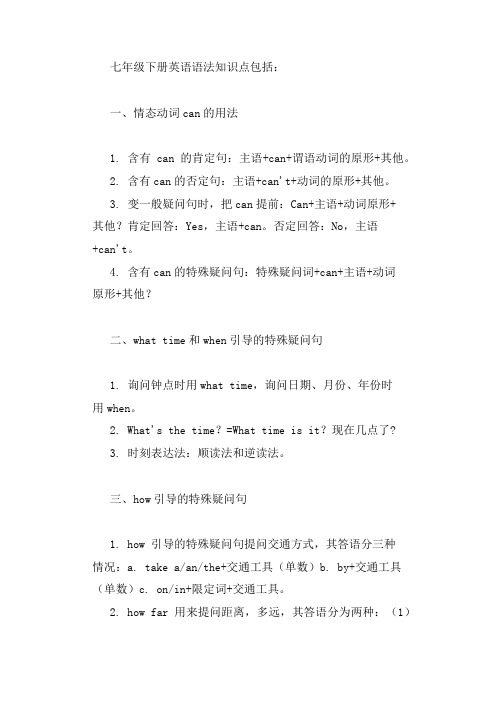
七年级下册英语语法知识点包括:一、情态动词can的用法1. 含有can的肯定句:主语+can+谓语动词的原形+其他。
2. 含有can的否定句:主语+can't+动词的原形+其他。
3. 变一般疑问句时,把can提前:Can+主语+动词原形+其他?肯定回答:Yes,主语+can。
否定回答:No,主语+can't。
4. 含有can的特殊疑问句:特殊疑问词+can+主语+动词原形+其他?二、what time和when引导的特殊疑问句1. 询问钟点时用what time,询问日期、月份、年份时用when。
2. What's the time?=What time is it?现在几点了?3. 时刻表达法:顺读法和逆读法。
三、how引导的特殊疑问句1. how 引导的特殊疑问句提问交通方式,其答语分三种情况:a. take a/an/the+交通工具(单数)b. by+交通工具(单数)c. on/in+限定词+交通工具。
2. how far 用来提问距离,多远,其答语分为两种:(1)用长度单位表示;(2)用时间表示。
3. how long 用来提问时间,意为多久,回答常用“for+段时间”。
4. how soon 用来提问做完某事还需要多长时间,用于将来时态,常用“in+时间段”来回答。
四、祈使句祈使句一般表示请求、命令、劝说、号召、警告等。
一般以动词原形开头,句末可以用感叹号或句号。
五、现在进行时现在进行时指当前时间正在发生的动作。
常与now,at this moment,listen,look等词连用。
七下第二单元语法要点英语
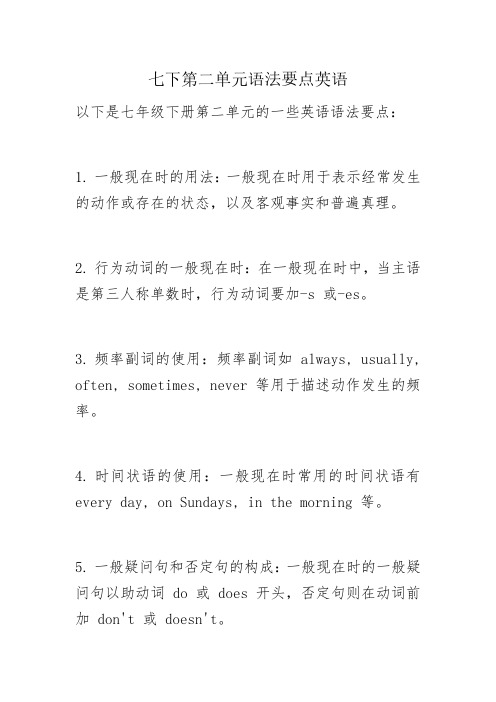
七下第二单元语法要点英语
以下是七年级下册第二单元的一些英语语法要点:
1.一般现在时的用法:一般现在时用于表示经常发生的动作或存在的状态,以及客观事实和普遍真理。
2.行为动词的一般现在时:在一般现在时中,当主语是第三人称单数时,行为动词要加-s或-es。
3.频率副词的使用:频率副词如always,usually, often,sometimes,never等用于描述动作发生的频率。
4.时间状语的使用:一般现在时常用的时间状语有every day,on Sundays,in the morning等。
5.一般疑问句和否定句的构成:一般现在时的一般疑问句以助动词do或does开头,否定句则在动词前加don't或doesn't。
6.介词的用法:介词用于表示时间、地点、方位等。
7.名词所有格的构成:名词所有格用于表示所属关系,通常在名词后加's。
8.形容词性物主代词的用法:形容词性物主代词用于修饰名词,起到限定作用。
这些是七年级下册第二单元的一些语法要点,希望对你有所帮助!。
七年级英语人教版(新目标)(最新版)下学期期末复习:知识点归纳
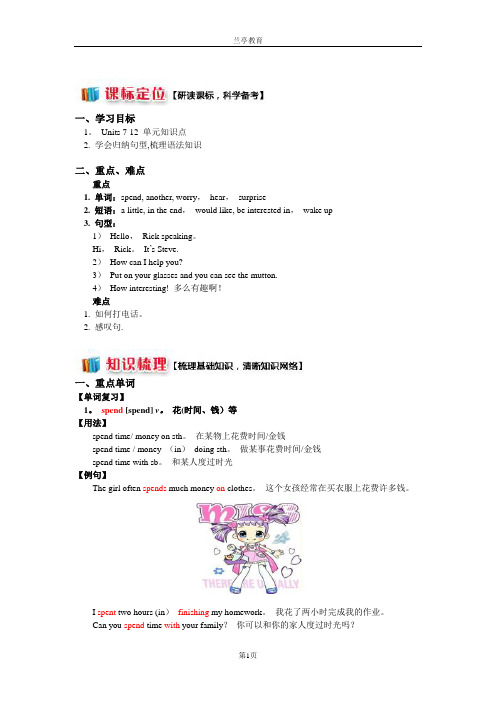
一、学习目标1。
Units 7-12 单元知识点2. 学会归纳句型,梳理语法知识二、重点、难点重点1. 单词:spend, another, worry,hear,surprise2. 短语:a little, in the end,would like, be interested in,wake up3. 句型:1)Hello,Rick speaking。
Hi,Rick。
It’s Steve.2)How can I help you?3)Put on your glasses and you can see the mutton.4)How interesting! 多么有趣啊!难点1. 如何打电话。
2. 感叹句.一、重点单词【单词复习】1。
spend [spend] v。
花(时间、钱)等【用法】spend time/ money on sth。
在某物上花费时间/金钱spend time / money (in)doing sth。
做某事花费时间/金钱spend time with sb。
和某人度过时光【例句】The girl often spends much money on clothes。
这个女孩经常在买衣服上花费许多钱。
I spent two hours (in)finishing my homework。
我花了两小时完成我的作业。
Can you spend time with your family?你可以和你的家人度过时光吗?【拓展】(1) pay常用来表示“付款”,主语是人,其后用介词for。
sb。
pays money for sth. = sb。
spends money on/ doing sth。
(2)cost 表示“花钱”,主语为物。
sth。
costs sb. money. = sb. pays money for sth。
= sb。
spends money on/(in)doing sth。
【K12学习】新目标七年级英语下册知识点 词汇、听力及语法
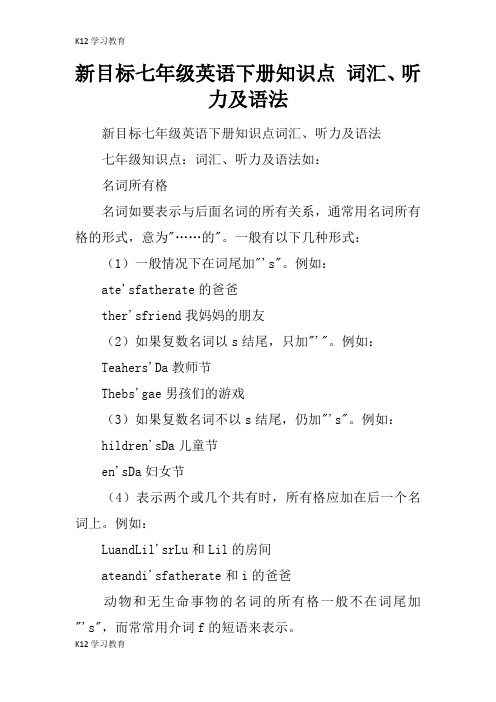
新目标七年级英语下册知识点词汇、听力及语法新目标七年级英语下册知识点词汇、听力及语法七年级知识点:词汇、听力及语法如:名词所有格名词如要表示与后面名词的所有关系,通常用名词所有格的形式,意为"……的"。
一般有以下几种形式:(1)一般情况下在词尾加"'s"。
例如:ate'sfatherate的爸爸ther'sfriend我妈妈的朋友(2)如果复数名词以s结尾,只加"'"。
例如:Teahers'Da教师节Thebs'gae男孩们的游戏(3)如果复数名词不以s结尾,仍加"'s"。
例如:hildren'sDa儿童节en'sDa妇女节(4)表示两个或几个共有时,所有格应加在后一个名词上。
例如:LuandLil'srLu和Lil的房间ateandi'sfatherate和i的爸爸动物和无生命事物的名词的所有格一般不在词尾加"'s",而常常用介词f的短语来表示。
aapfhina一幅中国地图thenaefherat她的猫的名字apitureffail我的家庭的一张照片thedrfthebedr卧室的门2祈使句祈使句主要用来表示说话人的请求、命令、建议、叮嘱等意图。
祈使句一般不用主语,读时用降调。
为使语气委婉、礼貌,常在句首或句尾加please。
在句尾时,please前多用逗号。
(1)祈使句肯定形式的谓语动词一律用动词原形。
Gandsee去看看。
ein,please请进。
(2)祈使句的否定形式常用dn't于句首。
Dn'tlaturbs不要看书。
Dn'tplantherad不要在马路上玩。
3Therebe的句子结构Therebe是一个"存在"句型,表示"有"的意思,肯定句的形式为:Therebe+名词(单数或复数)+地点状语或时间状语。
七年级英语下册Unit8Isthereapostofficenearhere短语语法知识点汇总新版人教新目标版

Unit 8 Is there a post office near here一、基础归纳【语法讲解】【教材内容解析】Section A1.police station (P. 43)police用作集体名词,表示“警察、警方”,作主语时,谓语动词用复数形式。
The police are looking for the little boy.2.Is there a hospital near here? (P. 43)Is there...?意为“有……吗?”,这是There be句型的一般疑问句。
---Is there a book in your backpack? ---Yes, there is.【拓展】辨析There be和haveThere be强调某个地方存在某人或者某物;have强调某人或者某物拥有什么东西。
There are two pencils and a pen in my pencil-box.I have a pen and two pencils.3.The pay phone is across from the library. (P. 44)across from意为“在……对面”,相当于opposite。
The bookstore is across from/opposite the bank.4.The pay phone is next to the library. (P. 44)next to意为“紧挨着、在……旁边”,相当于beside。
Our house is next to the post office.5.The pay phone is in front of the library. (P. 44)in front of意为“在物体外部的前面”;in the front of意为“在物体内部的前面”。
The tree is in front of the house.The teacher stands in the front of the classroom.6.How can I help you? (P. 44)此句常用于商店、饭店、旅馆等场所,作为对顾客的招呼语,相当于Can I help you?/May I help you?/What can I do for you?---Can I help you?---I want some bananas please.---What can I do for you?---I’d like to send this letter to Beijing.7.It’s not too far from here. (P. 44)far from意为“离……远”,相当于far away from,通常与不与具体的数字连用,若出现具体数字时,用away from。
人教新目标版2020-2021年七年级英语下册第三单元讲义重点短语语法归纳及练习
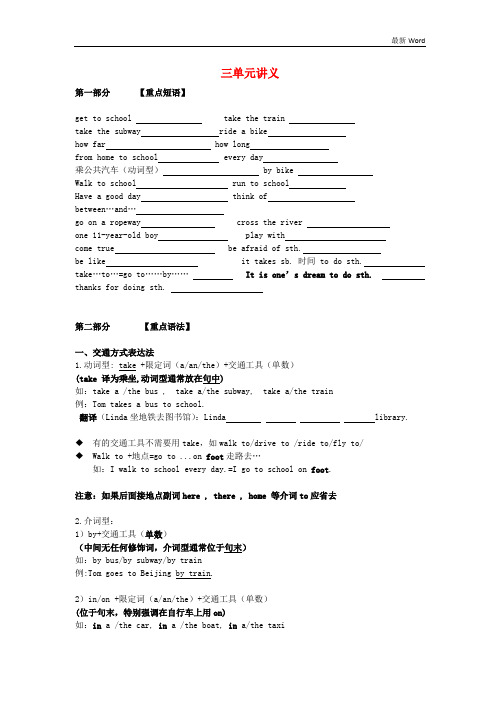
三单元讲义第一部分【重点短语】get to school take the traintake the subway ride a bikehow far how longfrom home to school every day乘公共汽车(动词型) by bikeWalk to school run to schoolHave a good day think ofbetween…and…go on a ropeway cross the riverone 11-year-old boy play withcome true be afraid of sth.be like it takes sb. 时间 to do sth. take…to…=go to……by…… It is one’s dream to do sth.thanks for doing sth.第二部分【重点语法】一、交通方式表达法1.动词型: take +限定词(a/an/the)+交通工具(单数)(take 译为乘坐,动词型通常放在句中)如:take a /the bus , take a/the subway, take a/the train例:Tom takes a bus to school.翻译(Linda坐地铁去图书馆):Linda library.◆有的交通工具不需要用take,如walk to/drive to /ride to/fly to/◆Walk to +地点=go to ...on foot走路去…如:I walk to school every day.=I go to school on foot.注意:如果后面接地点副词here , there , home 等介词to应省去2.介词型:1)by+交通工具(单数)(中间无任何修饰词,介词型通常位于句末)如:by bus/by subway/by train例:Tom goes to Beijing by train.2)in/on +限定词(a/an/the)+交通工具(单数)(位于句末,特别强调在自行车上用on)如:in a /the car, in a /the boat, in a/the taxiOn a /the bus, on a /the train, on a /the subway例:My father goes to work on a bus/in a car.注意:1.对交通工具提问用:how(怎样)如:My father goes to work on a bus(对划线部分提问)How does your father go to work?【试一试】1. I think you can _____to the new park. It’s a little far.A. by busB. take a busC. on footD.walk2. –-How does your brother usually go to school?–- ______car.A. ByB. InC. OnD.With3. I often go to school _____ my father’s car and go back home ______ foot.A. in; onB. by; byC. by; inD. on; by4. Jim often goes to school ______ bike. But today he goes to school ______ the school bus.A. on; byB. by; byC. by; onD. on; on二、交通方式之间的互换。
《新目标英语》七年级下册重点句型、短语归纳(2)

Unit 8 I’d like some noodles.Ⅰ、Useful expressions:1. I’d like = I would like 我想要2. what kind of … 哪种……3. beef and tomato noodles 牛肉西红柿面4. what size bowl of … 多大碗的……5. he’d like = he would like 他想要6. a small/medium/large bowl of … 一份儿小碗的/ 中号的/ 大碗的……7. a large glass of orange juice一大杯橙汁8. green tea/black tea绿茶/红茶9. at the House of Dumplings 饺子馆10. have some great specials 有些很棒的特色餐11. lunch special 特色午餐12. get dumplings 吃饺子13. strawberry and banana ice cream 草莓香蕉冰淇淋14. a small orange juice 一小杯桔子汁儿15. a bowl of beef and tomato noodles 一碗番茄牛肉面16. what size of dessert 多大尺寸的甜品17. order sth. 点(菜或者饮料……)Ⅱ、Sentences:1. I’d like some noodles . 我想要点面条。
2.What kind of noodles would you like? 你想要哪种面条?3.What size bowl of noodles would you like? 你想要多大碗的面条?I’d like a small/medium/large size bowl. 我想要一小/中/大碗。
4. What kind of noodles do you have? 你这儿有哪种面条?3.What size do you have? 你这儿有多大份儿的?4.I like … and …我喜欢……和……5.I don’t like … or … 我不喜欢……和……6.Special 1 has beef and onions. 一号特色餐有牛肉和洋葱。
新目标(Go for it)版七年级英语下册各单元知识点总结
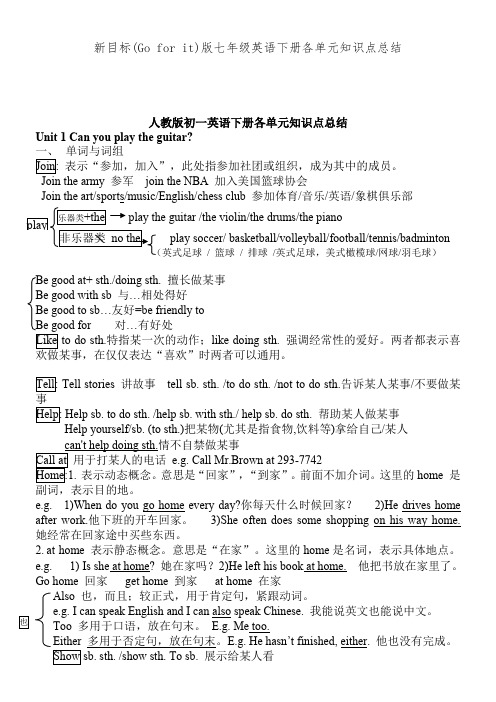
新目标(Go for it)版七年级英语下册各单元知识点总结人教版初一英语下册各单元知识点总结Unit 1 Can you play the guitar?一、 单词与词组表示“参加,加入”,此处指参加社团或组织,成为其中的成员。
Join the army 参军 join the NBA 加入美国篮球协会Join the art/sports/music/English/chess club 参加体育/音乐/英语/象棋俱乐部play soccer/ basketball/volleyball/football/tennis/badminton / 篮球 / 排球 /英式足球,美式橄榄球/网球/羽毛球)Be good at+ sth./doing sth. 擅长做某事Be good with sb 与…相处得好Be good to sb …友好=be friendly toBe good for 对…有好处特指某一次的动作;like doing sth. 强调经常性的爱好。
两者都表示喜讲故事 tell sb. sth. /to do sth. /not to do sth.告诉某人某事/不要做某帮助某人做某事Help yourself/sb. (to sth.)把某物(尤其是指食物,饮料等)拿给自己/某人e.g. Call Mr.Brown at 293-7742意思是“回家”,“到家”。
前面不加介词。
这里的home 是e.g. 1)When do you go home every day?你每天什么时候回家? 2)He drives home after work.他下班的开车回家。
3)She often does some shopping on his way home. 她经常在回家途中买些东西。
2. at home 表示静态概念。
意思是“在家”。
这里的home 是名词,表示具体地点。
新目标人教版 七年级下册英语期中考试知识点和语法总结(印刷)
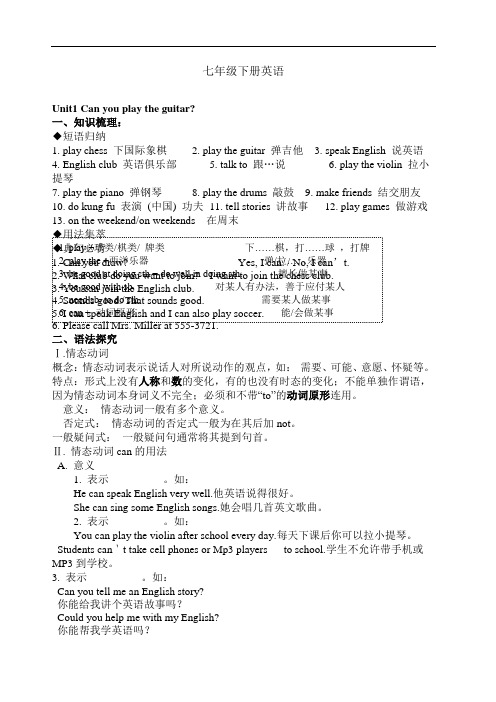
七年级下册英语Unit1 Can you play the guitar?一、知识梳理:◆短语归纳1. play chess 下国际象棋2. play the guitar 弹吉他3. speak English 说英语4. English club 英语俱乐部5. talk to 跟…说6. play the violin 拉小提琴7. play the piano 弹钢琴 8. play the drums 敲鼓 9. make friends 结交朋友10. do kung fu 表演 (中国) 功夫 11. tell stories 讲故事 12. play games 做游戏13. on the weekend/on weekends 在周末 ◆用法集萃◆典句必背 1. Can you draw? Yes, I can. / No, I can ’t. 2. What club do you want to join? I want to join the chess club. 3. You can join the English club. 4. Sounds good./That sounds good.5. I can speak English and I can also play soccer.6. Please call Mrs. Miller at 555-3721.二、语法探究Ⅰ.情态动词概念:情态动词表示说话人对所说动作的观点,如: 需要、可能、意愿、怀疑等。
特点:形式上没有人称和数的变化,有的也没有时态的变化;不能单独作谓语,因为情态动词本身词义不完全;必须和不带“to ”的动词原形连用。
意义: 情态动词一般有多个意义。
否定式: 情态动词的否定式一般为在其后加not 。
一般疑问式: 一般疑问句通常将其提到句首。
Ⅱ. 情态动词can 的用法A. 意义1. 表示__________。
初一英语(蛟川书院)英语新目标七年级下册语法等重点复习整理
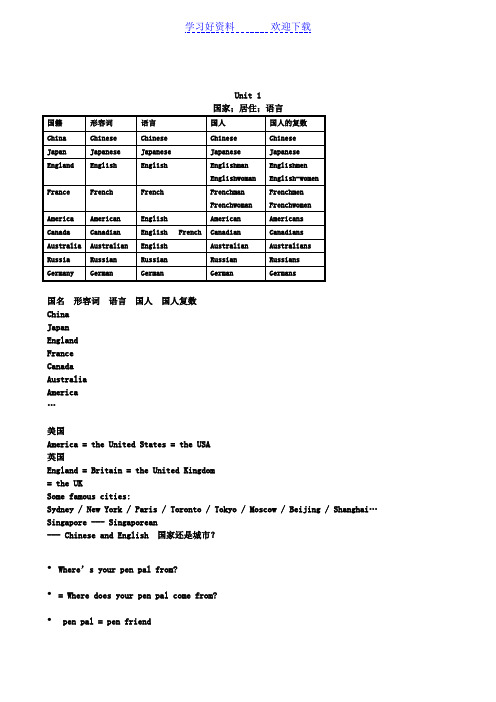
Unit 1国家;居住;语言国名形容词语言国人国人复数ChinaJapanEnglandFranceCanadaAustraliaAmerica…美国America = the United States = the USA英国England = Britain = the United Kingdom= the UKSome famous cities:Sydney / New York / Paris / Toronto / Tokyo / Moscow / Beijing / Shanghai…Singapore --- Singaporean--- Chinese and English 国家还是城市?•Where’s your pen pal from?•= Where does your pen pal come from?• pen pal = pen friend• city --- cities country --- countries• language --- languages •BeijingNingboHangzhou Jiaochuan•Where does you live?•He lives in Tokyo.•one of the countries (is…)其中一个•What language do you speak?•I speak Chinese.•Does she have any brothers or sisters?•Can you write to me soon?•Please write to me soon.•Please write soon.•Please write and tell me about yourself.•I think China is a very interesting country.I don’t think China…否定前置语言不可数:•speak a little / some / much / little French•go to the movies (with sb.) 固定短语•too difficult 太难了•on weekends = on Saturdays and Sundays•at school•write an e-mail about yourself• likes and dislikes• speak Spanish• write to sb. = write a letter to sb.• on December 1 / on the morning of Dec.1• have a good time• = have (great) fun• = enjoy oneself 根据主语(myself / yourself / himself / herself / ourselves / yourselves / themselves) • My favorite subject is P.E.• My favorite subjects are P.E. and math.•like doing sth. / like to do sth.经典句型:There are three people in my family. They are my father, my mother and I.Unit 2地点;方位;问路• post office• library• hotel• restaurant• bank• supermarket• street• pay phone• park•…--- Thank you (very much). / Thanks a lot.--- You’re welcome. / That’s all right. / That’s OK. / Not at all. 不用谢就近原则(在…有什么吗?)•Is there …?•Yes, there is. / No, there isn’t.•Are there …?•Yes, there are. / N o, there aren’t.• on Fifth Avenue• near here = in the neighborhood• around here• around me• on Bridge Street• on Center Street• turn left / right (at New Park) 在哪个点• go straight down (Bridge Street)•on the left / right (of…)在…左边/右边•on your left / right 在你左边/右边•go / walk along this street•Here’s the hotel. Here’s Bridge Street. description words•an old hotel / a new park• small / big / clean / dirty / busy / quiet • come over to = come to• watch a video• a quiet street off Fifth Avenue (away from) •I’ll see you at 2:30.• show me the way• at the second crossing / turning•enjoy the city’s quiet streets and small parks • take a walk through the park• Across from the park is an old hotel.• a small house with an interesting garden • This is the beginning of the garden tour. • read from the beginning of the book• a good place to have fun•It’s in there.ⅹIt’s there / here.• tour guide 导游;向导;旅游手册;导向图•on a busy street• I know your are arriving next Sunday.• Let me tell you the way to my house.let sb. do sth.• Take a taxi from the airport.• pass a bank on your right 经过•go down Long Street• turn left at NewPark• I hope you have a good trip.• far from 离…远• arrive at the airport小地方 /• arrive in Beijing大地方•reach Beijing• get to Beijing•arrive/reach/get heretherehomeUnit 3动物名;习性;喜好及理由•tiger• elephant• koala• dolphin• panda• lion• penguin• giraffe•…•Let’s see the lions first.• Why do you want to see the lions? •Because they’re cute.(kind做名词:种类)• a kind of 一种•all kinds of 所有种类;各种各样•many kinds of 许多种类•different kinds of 不同种类•kind of = a little = a little bit 有点…• pretty = quite 相当…• so如此too太really真的+ 形容词adj. • be friendly to sb. = be kind to sb.• Pandas are my favorite animals.•= My favorite animals are pandas.•= My favorite animal is pandas.• pretty smart / kind of interesting• more than once 多于一次• Why not?• South Africa (Africa名 = African形)• What other animals do you like?• like to do sth.• play with sb.• eat grass(不可数)•She’s very shy, so please be quiet.• during the day = in the day• at night• eat leaves (leaf --- leaves knife --- knives)• He usually sleeps and relaxes 20 hours every day. (relax --- relaxes) •give description of…• be afraid of sb. / sth. / doing sth. 害怕…• He is twelve years old.• He is a twelve-year-old boy.• an eight-year-old girl• an eighteen-month-old baby•Isn’t it beautiful? Yes, it is. / No, it isn’t.•Isn’t he cute? Yes, he is. / No, he isn’t.•Aren’t you a student?Yes, I am. / No, I’m not.Unit 4职业名;工作地点;工作特点;喜好理由;将来理想•shop assistant• doctor• actor• reporter• policeman• waiter• bank clerk• student•…• want sth. = would like sth.• want to do sth. = would like to do sth.• want sb. to do sth. = would like sb. to do sth.• want to be an actor• want to be young and beautiful• That sounds really interesting. •policeman --- policemen •policewoman --- policewomen•What does he do?• = What is he?•= What’s his job?问职业三种方式:•What do you do?•= What are you?•= What’s your job.• have a lot of new things to do • want to be a reporter•work with people and money • get their money from me •get sth. from …从…拿/得到•count money 数钱•make much money 赚很多钱•wear a white uniform 单•wear uniforms 复• in the day = during the day 在白天• at night 在夜间• interesting but kind of dangerous •Thieves don’t like me. (thief --- thieves) • like talking to people (talk to / with sb.) • meet interesting people• ask them questions• work late•I’m busy when people go out to dinners.• give me their money• = give their money to me(give sb. sth = give sth. to sb.) = show用法•sometimes有时候• every day每天 / everyday日常的在工作:•be at work = be working• Where does your sister work?• She works in a hospital.• danger名--- dangerous形• a small red hat / a big blue T-shirt 一顶小红帽(形容词顺序)•exciting fun interesting• boring busy difficult tiring累人的• dangerous危险的--- safe安全的•区别和拼写:different / difficult•be interested in… 对…感兴趣• (Are you interested in this job?)• a busy but exciting job• other interesting people•招聘广告标题:Wanted / Help Wanted• want ads招聘广告• work late / work hard / meet people• talk with people / write stories• work for a magazine• work for us as a reporter• sing and dance• work with other young people• want to be in the school play• work evenings and weekends• call Frank at 5555-3256•小小区别:need需要/ want想要•可数:newspaper (s)• in the newspaper 在报纸上面(指内容)•news新闻(a piece of news一则新闻)• an international school for children of 5-12• skills• want a P.E. teacher to teach soccer• want a music teacher to teach (the) guitar• teach sb. sth. (teach us/me English)• work / study hard• be ill in hospital 住院• work in the hospital 在医院•be late for class / school 上课上学迟到• be busy with sth. 忙于某事• be busy doing sth. 忙于做某事I’m busy with my homework.I’m busy doing my homework.Unit 5进行时;现在分词;动词短语;介绍照片;地点介词现在进行时的标志:•now• right now现在,此刻(区别于just now用过去时)• Look!• Listen!•It’s 10 o’clock (now).• Where is Tom?...• these days 这些天•In the first photo…现在分词的构成:•swimming / running / getting / putting…•What’s he doing? He’s reading.•What are you doing? I’m watching TV.• activity activities:doing (one’s) homeworkwatching TVcleaning the roomeating dinnerreadingwriting a lettertalking on the phone (take / talk)activities:writing a letter购物shop --- shopping去购物go shoppingswimming at the pooleating (错误eatting)places:on the playgroundat the swimming poolat the mallin the libraryat schoolat home•That sounds good.• This TV show is boring.• This video is boring.• Do you want to go to the movies? • When do you want to go?• Let’s go at 6 o’clock.• Sure.• What is happening?发生•wait for sb. / sth.等待•What are they talking about?谈论• Who are they talking to?与…聊天•what’s = what is•he’s = he is•she’s = she isThanks for sth. / doing sth.Thank you for sth. / doing sth.Thanks for your letter and the photos.Thank you for helping me.Thanks for your help.a letter from Lucy to Tom•Here is / are…Here are some of my photos.Here is the money.I’m with my sister.be with sb. 与某人在一起in the first / second / next / last photoa photo of my familyThis is … and that is …由近及远• take photos with a camera• let sb. do sth. (Let me help you.)• put on 穿上(动作)(Put on your coat. It’s cold outside.)• wear 穿着(状态)(She is wearing a dress today.)• in 修饰在名词后面(the girl in red / the boy in a hat / the woman in a yellow dress) She is in a red skirt.= She is wearing a red skirt.• surf --- surfing冲浪•familyMy family has a shower.家庭My family are all at home today.家人以下这些词做主语,谓语动词用单数:someone 某人;有人somebodyno one 没有人nobodyanyone 任何人everyone 每个人•come / go / leave / arrive可现在进行时表将来Unit 6问天气;现在进行时;问进展怎么样;描述正在做的行为;播报描述天气•What’s the weather like in Beijing?= How’s the weather in Beijing?•It’s sunny / windy / cloudy / snowy / rainy.•It’s raining / snowing.rain / snow 做动词时:It often snows in Harbin.It is raining outside.It often rains heavily in summer.rain / snow 做名词时不可数:There’s much rain here.There’s little snow in this city.• What was the weather like yesterday?• How was the weather yesterday?• It was sunny / windy / rainy / cloudy…overcast 阴天的•Happy New Year!•Nothing much. 没什么。
七年级下册英语语法点总结(新目标)

七年级下册英语语法点总结Unit 1 Where’s your pen pal from?一.短语:1 .be from = come from 来自于----2.live in 居住在---3.on weekends 在周末4 .write to sb = write a letter to sb 给某人写信;写信给某人5 .in the world 在世界上in China 在中国6.pen pal 笔友14 years old 14岁favorite subject 最喜欢的科目7.the United States 美国the United Kingdom 英国New York 纽约8.speak English 讲英语like and dislike 爱憎9.go to the movies 去看电影play sports 做运动二.重点句式:1 Where’s your pen pal from? = Where does your pen pal from/2 Where does he live?3 What language(s) does he speak?4 I want a pen pal in China.5 I can speak English and a little French.6 Please write and tell me about yourself.7 Can you write to me soon?8 I like going to the movies with my friends and playing sports.三.本单元的国家,人民、语言对应。
1 Canada---- Canadian---- English / French2 France------ French------French3 Japan------Japanese----Japanese4 Australia----Australian----- English5 the United States------ American---- English6 the United Kingdom---British----- EnghishUnit 2 Where’s the post offic e?一.Asking ways: (问路)1.Where is (the nearest) ……?(最近的)……在哪里?2.Can you tell me the way to ……?你能告诉我去……的路吗?3.How can I get to ……?我怎样到达……呢?4.Is there …… near here / in the neighborhood? 附近有……吗?5.Which is the way to ……?哪条是去……的路?二.Showing the ways: (指路)1. Go straight down / along this street. 沿着这条街一直走。
新目标七年级英语下册各单元考点总结

在具体几点中介词用at,在一个比较小的场所,介词用at
At 7 o’clock
在家at home在学校at schoolatthepool在游泳池
现在进行时得一些考点,现在分词构成等
Example:Look!The twins_____their mother do the housework.
Is Aunt Wang there? –Yes,she is/No,she isn’t.
Thank you for joining CCTV’s Around The World show?
What’s she doing?she’s cooking
考点解析:
It不仅用来指物还用来指代天气,指代事情:
a pop singer一位流行歌手wear glasses/pink shirt戴着眼镜/穿着粉色寸衣
go shopping去购物the captain of the basketball team篮球队队长
curly /short/straight/long hair卷/短/直发
ofmedium height/build中等高度/身体
With表示有什么…;人带着…,和…如:Come with your sister.和你姐姐一起来
-What does Lee look like? -He’s tall _________ blonde hair.
A. in B .on C. with .D has
a little(bit)一点儿…
It is a good place to do sth.
It is a good place to have fun.
Unit 3Why do you like koalas?
《新目标英语》七年级下册 重点句型短语归纳
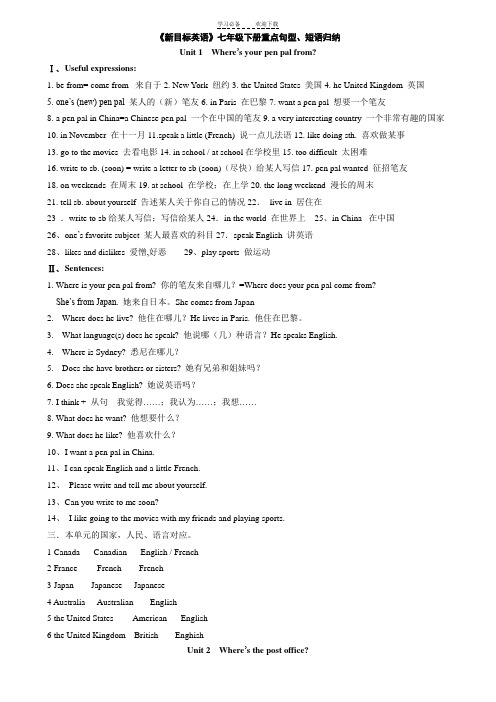
《新目标英语》七年级下册重点句型、短语归纳Unit 1 Where’s your pen pal from?Ⅰ、Useful expressions:1. be from= come from 来自于2. New York 纽约3. the United States 美国4. he United Kingdom 英国5. one’s (new) pen pal 某人的(新)笔友6. in Paris 在巴黎7. want a pen pal 想要一个笔友8. a pen pal in China=a Chinese pen pal 一个在中国的笔友9. a very interesting country 一个非常有趣的国家10. in November 在十一月11.speak a little (French) 说一点儿法语12. like doing sth. 喜欢做某事13. go to the movies 去看电影14. in school / at school在学校里15. too difficult 太困难16. write to sb. (soon) = write a letter to sb (soon)(尽快)给某人写信17. pen pal wanted 征招笔友18. on weekends 在周末19. at school 在学校;在上学20. the long weekend 漫长的周末21. tell sb. about yourself 告述某人关于你自己的情况22.live in 居住在---23 .write to sb给某人写信;写信给某人24.in the world 在世界上25、in China 在中国26、one’s favorite subject 某人最喜欢的科目27.speak English 讲英语28、likes and dislikes 爱憎,好恶29、play sports 做运动Ⅱ、Sentences:1. Where is your pen pal from? 你的笔友来自哪儿?=Where does your pen pal come from?She’s from Japan. 她来自日本。
新目标go,for,it,七年级下册单元单词及知识点

新目标go,for,it,七年级下册单元单词及知识点篇一:新版新目标英语七年级下册各单元知识点汇总新版新目标英语七年级下册各单元知识点汇总Unit 1 Can you play the guitar1. guitar为一种乐器,注意play与表示乐器的名词连用时,前要加定冠词the。
2. join意为―参加(某个组织成为其成员)‖,一般常和介词in连用。
3. have a swim游泳;go swimming去游泳4. ―下棋‖用play chess,而不用play the chess。
5. Painted 派生词:painter n.画家 painting n.画(注意与draw的区别: paint指用颜料等绘画;而draw指用钢笔、铅笔等画。
)6. 注意区分:speak,say,talk和tella) ①say指用语言表达思想,着重说话的内容或强调说话这一动作,不表示说话的性质。
b) ②speak强调说话的动作、声音,而不强调内容。
在正式场合表示发言、演讲,说某种语言用speak。
c) ③talk表示两个人或多个人在一起讲话、谈论(多指随意谈论)。
d)④tell的意思是―告诉,讲述,吩咐‖,讲故事或讲笑话多用tell。
7. 弹钢琴要用play the piano,其中定冠词the不能省略。
8. Show 用法:show作动词,意为―表演,演出,出示……给某人看‖,有时与介词搭配使用,构成show sth. to sb.=show sb. sth.。
show作名词,意为―展览,展出‖。
构成短语on show,意为―在展出‖。
9. 表示―在星期几‖要用介词on。
如:on Sunday―在星期日‖。
10. Little 用法:1)little还有―小的,小巧的‖之意,带有小的可爱之意。
2)注意little与a little 的区别:little与a little都可表示数量,修饰不可数名词。
但little表示否定意义,而a little表示肯定意义。
新目标英语七年级 (下)Unit 7 知识要点归纳

新目标英语七年级(下)Unit 7 知识要点归纳作者:来源:《中学生英语·七年级》2020年第05期一、重点词汇rain v. 下雨 n. 雨水 snow v. 下雪 n. 雪 windy adj. 有风的;多风的cloudy adj. 多云的 sunny adj. 晴朗的 weather n. 天气dry adj. 干燥的 cold adj. 寒冷的;冷的 hot adj. 热的warm adj. 温暖的 soon adv. 不久;很快 hard adv. 努力地 adj. 困难的skate v. 滑冰 visit v. 拜访;参观 message n. 信息;消息summer n. 夏天;夏季 winter n. 冬天;冬季 vacation n. 假期二、重点词组take a message 捎个口信;传话 call (sb.) back (给某人)回电话have a good time玩得开心 on (a) vacation 度假right now 此刻;马上 no problem 没有问题study hard 努力学习 visit friends 拜訪朋友not too bad 不算太坏 play computer games 玩电脑游戏三、重点难点分析—How is the weather in Beijing?北京的天气怎么样?—It’s sunny. 天气晴朗。
1. weather作名词意为“天气”,是不可数名词,前面不能用不定冠词修饰。
例如:What fine weather!多好的天气啊!2. 询问天气用How is the weather?或What’s the weather like?来表示。
回答一般用It’s...。
例如:—What’s the weather like in Shanghai?/How is the weather in Shanghai?上海是什么天气?—It’s cloudy. 多云。
新目标英语七年级下册Unit6_I’m_watching_TV知识点

新⽬标英语七年级下册Unit6_I’m_watching_TV知识点Unit 6 I’m watching TV.词组◆watch TV 看电视◆read a newspaper 读报纸◆talk on the phone◆listen to a CD 听CD◆use the computer 使⽤电脑◆make soup/ zongzi 做汤/粽⼦◆wash the dishes=do the dishes 洗碗◆go to the movies=see a film=go to cinema 看电影(3种表达)看书看电视看我◆Not much.=Nothing much 没有什么。
◆wash one’s clothes 洗⾐服◆eat out 出去吃◆meet at my home◆ see you then 到时见◆talk about sth 谈论某事Talk sb 和某⼈谈话◆in the tree 在树上(树外之物)◆on the tree 在树上(树上长出来的)◆drink tea◆do some cleaning/reading 做清洁/阅读◆in the United States= in the US 在美国◆ Dragon Boat Festival: 端午节◆live with sb. 和……住在⼀起住在成都◆boat races◆any other night 其他任何⼀个夜晚(any other + 可数名词any other night / picture / singer)◆host family 寄住家庭◆miss one’s family 想念家⼈◆ wish to do sth 希望做某事◆ talk on the phone 在电话上交谈◆ That sounds good. 那听起来不错◆ wait for sb 等待某⼈◆ a useful book ⼀本有⽤的书◆ study for a test 为⼀个考试⽽学习study for sth. 为了什么⽽学习◆ Be like 像sound like 听起来像look like 看起来像◆对某⼈友好◆thanks for = thank you for… 为某事⽽感谢◆ Wha t’s he doing? 他正在⼲嘛?◆He’s reading. 他正在阅读。
七下英语二单元语法

七下英语二单元语法
摘要:
一、七年级下册英语第二单元语法概述
1.单元主题
2.语法知识点
二、动词的一般现在时
1.动词的一般现在时构成
2.一般现在时的疑问句与否定句
三、动词的一般过去时
1.动词的一般过去时构成
2.一般过去时的疑问句与否定句
四、情态动词can的用法
1.can的肯定句与否定句
2.can的一般疑问句
五、日常交际用语
1.问候与介绍
2.道别与应答
正文:
七年级下册英语第二单元语法主要涉及动词的一般现在时、一般过去时以及情态动词can的用法,同时学习日常交际用语。
首先,本单元的主题是关于日常交际,通过学习不同场景下的问候、介
绍、道别等用语,提高学生的口语表达能力。
在此基础上,本单元还涉及动词的一般现在时和一般过去时,帮助学生更好地描述动作的发生时间。
在动词时态方面,一般现在时表示现在的习惯、事实或一般情况。
其构成是动词原形,如:I study English every day.一般过去时则表示过去某个特定时间发生的动作,其构成是动词过去式,如:I studied English yesterday.在学习这两个时态时,学生还需掌握疑问句和否定句的构成方法。
此外,本单元还讲解了情态动词can的用法。
can表示能力或允许,用于疑问句时,用can you提问;用于否定句时,用can"t表示不能,如:I can"t swim.对于can的一般疑问句,疑问部分用can you,肯定回答为Yes,I can;否定回答为No,I can"t。
(人教新目标)初一英语语法总结

初一英语语法总结一、词法1、名词A)、名词的数我们知道名词可以分为可数名词和不可数名词,而不可数名词它没有复数形式,但可数名词却有单数和复数之分,复数的构成如下:一)在后面加s。
如:fathers, books, Americans, Germans, apples, bananas二)x, sh, ch, s, tch后加es。
如:boxes, glasses, dresses, watches, wishes, faxes 三)1)以辅音字母加y结尾的变y为i再加es 如:baby-babies, family-families, duty-duties, comedy-comedies, documentary-documentaries, story-stories2)以元音字母加y结尾的直接加s。
如:day-days, boy-boys, toy-toys, key-keys, ways 四)以o结尾加s(外来词)。
如:radios, photos, 但如是辅音加o的加es:如: tomatoes 西红柿, potatoes马铃薯五)以f或fe结尾的变f为v再加es(s)。
如:knife-knives, wife-wives, half-halves, shelf-shelves, leaf-leaves, yourself-yourselves六)单复数相同(不变的)有:fish, sheep, deer鹿子, Chinese, Japanese七)一般只有复数,没有单数的有:people,pants, shorts, shoes, glasses, gloves, clothes, socks八)单词形式不变,既可以是单数也可以是复数的有:police警察局,警察, class班,同学, family家,家庭成员九)合成的复数一般只加主要名词,多数为后一个单词。
如:action movie-action movies, pen pal-pen pals; 但如果是由man或woman所组成的合成词的复数则同时为复数。
- 1、下载文档前请自行甄别文档内容的完整性,平台不提供额外的编辑、内容补充、找答案等附加服务。
- 2、"仅部分预览"的文档,不可在线预览部分如存在完整性等问题,可反馈申请退款(可完整预览的文档不适用该条件!)。
- 3、如文档侵犯您的权益,请联系客服反馈,我们会尽快为您处理(人工客服工作时间:9:00-18:30)。
七年级下册英语语法点总结
Unit 1 Where’s your pen pal from?
一.短语:
1 .be from = e from 来自于----
2.live in 居住在---
3.on weekends 在周末
4 .write to sb = write a letter to sb 给某人写信;写信给某人
5 .in the world 在世界上in China 在中国
6.pen pal 笔友14 years old 14岁favorite subject 最喜欢的科目7.the United States 美国the United Kingdom 英国New York 纽约8.speak English 讲英语like and dislike 爱憎
9.go to the movies 去看电影play sports 做运动
二.重点句式:
1 Where’s your pen pal from? = Where does your pen pal from/
2 Where does he live?
3 What language(s) does he speak?
4 I want a pen pal in China.
5 I can speak English and a little French.
6 Please write and tell me about yourself.
7 Can you write to me soon?
8 I like going to the movies with my friends and playing sports.
三.本单元的国家,人民、语言对应。
1 Canada---- Canadian---- English / French
2 France------ French------French
3 Japan------Japanese----Japanese
4 Australia----Australian----- English
5 the United States------ American---- English
6 the United Kingdom---British----- Enghish
Unit 2 Where’s the post office?
一.Asking ways: (问路)
1.Where is (the nearest) ……?(最近的)……在哪里?2.Can you tell me the way to ……?你能告诉我去……的路吗?3.How can I get to ……?我怎样到达……呢?
4.Is there …… near here / in the neighborhood? 附近有……吗?5.Which is the way to ……?哪条是去……的路?
二.Showing the ways: (指路)
1. Go straight down / along this street. 沿着这条街一直走。
2. Turn left at the second turning. 在第二个路口向左转。
3. You will find it on your right. 你会在你右手边发现它。
4. It is about one hundred metres from here. 离这里大约一百米远。
5. You’d better take a bus. 你最好坐公交车去。
(You’d bett er+动词原形)
三.词组
1. across from …… 在……的对面across from the bank 在银行的对面
2. next to…… 紧靠…… next to the supermarket 紧靠超市
3. between……and…… 在……和……之间
between the park and the zoo 在公园和动物园之间
among 表示位于三者或三者以上之间
4. in front of…… 在……前面
There is a tree in front of the classroom. 课室前面有棵树。
in the front of…… 在……(内)的前部
There is a desk in the front of the classroom. 课室内的前部有张桌子。
5. behind…… 在……后面
behind my house 在我家后面
6. turn left/ right 向左/右拐
on the left/right of…… 在某物的左/右边
on the left of our school 在我们学校的左边
on one’s l eft/right 在某人的左/右边
on my left 在我左边
7. go straight 一直走
8. down /along…… 沿着……(街道)
down/along Center Street 沿着中央街
9. in the neighborhood=near here 在附近
10 wele to…… 欢迎来到……
11. take /have a walk 散步
12. the beginning of…… ……的开始,前端
at the beginning of…… 在……的开始,前端
in the beginning 起初,一开始
13. have fun=have a good time=enjoy oneself 玩得开心,过得愉快
我昨天玩得很开心。
I had fun yesterday.
I had a good time yesterday.
I enjoyed myself yesterday.
14. have a good trip 旅途愉快
15. take a taxi 坐出租车
16. 到达:get to +地方get here/ there/ home 到这/那/家
arrive in +大地方I arrive in Beijing.
arrive at +小地方I arrive at the bank.
reach +地方
17.go across 从物体表面横过go across the street 横过马路
go through 从空间穿过go through the forest 穿过树林
18.on + 街道的名称。
Eg: on Center Street
at + 具体门牌号+街道的名称Eg: at 6 Center Street
三.重难点解析。
